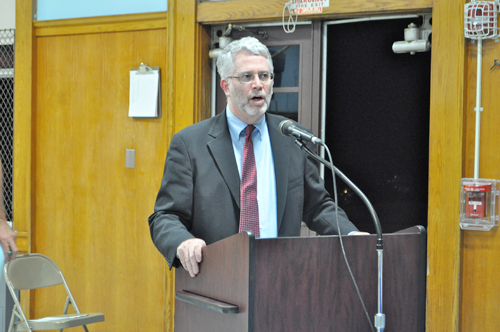SWR budget gap could jeopardize programs

The Shoreham-Wading River school board is discussing the possible elimination of some non-mandated programs next year, including athletics, full-day kindergarten and musical performances, if the district can’t find a way to close a projected $6 million budget gap.
While the 2013-14 budget keeps school programs intact, school officials have said it will be difficult in future years to find ways to trim the budget to fit within the state-mandated tax cap, largely because increases in teacher salaries and benefits will outpace the cuts.
Programs aren’t the only things in danger of being cut or reduced. Positions like teacher aides, tutors and an athletic trainer are also potentially at risk, Superintendent Steven Cohen said during the school board’s regular meeting Tuesday.
“We’re now at the point where the board needs to make some strategic choices,” he said. “We need to decide, ‘Are we going to dip into savings? And if so, how much?’ That’s where we are.”
Mr. Cohen said he believes the gap could be filled temporarily by dipping into the district’s savings. In March, the district had reserves of $14.7 million, with $9.9 million still due from prior-year state aid.
During the meeting’s public comment period, Shoreham-Wading River PTA vice president Alisa McMorris expressed concern about eliminating all non-mandated programs and asked how her group could help.
“At some point, there’s going to be something that gives,” she said. “This is a black hole for every district on Long Island, so we’re definitely not alone.”
During the 2013-14 budget process earlier this year, Mr. Cohen said the district would be able to stay within the tax levy cap without having to cut school programs by making one-time cuts and reducing professional services. In May, residents in the Shoreham-Wading River district approved a $66.1 million budget, which represents a nearly 5.5 percent spending increase and carries a 2.29 percent tax rate (the most allowed under the tax cap).
“These are beyond difficult times in terms of trying to make these decisions,” school board president Bill McGrath said. “It’s very difficult choices we’re being forced to make here. We’re open to all suggestions.”
As the budget process unfolds for the 2014-15 school year, Mr. Cohen said the community and the board may need to come together and decide that some programs are just too important to lose.
“And if that means we need to try to convince the community to pierce the cap, that’s what it means,” he said. “It’s a tough question, but I think that’s what the numbers are telling us.”








